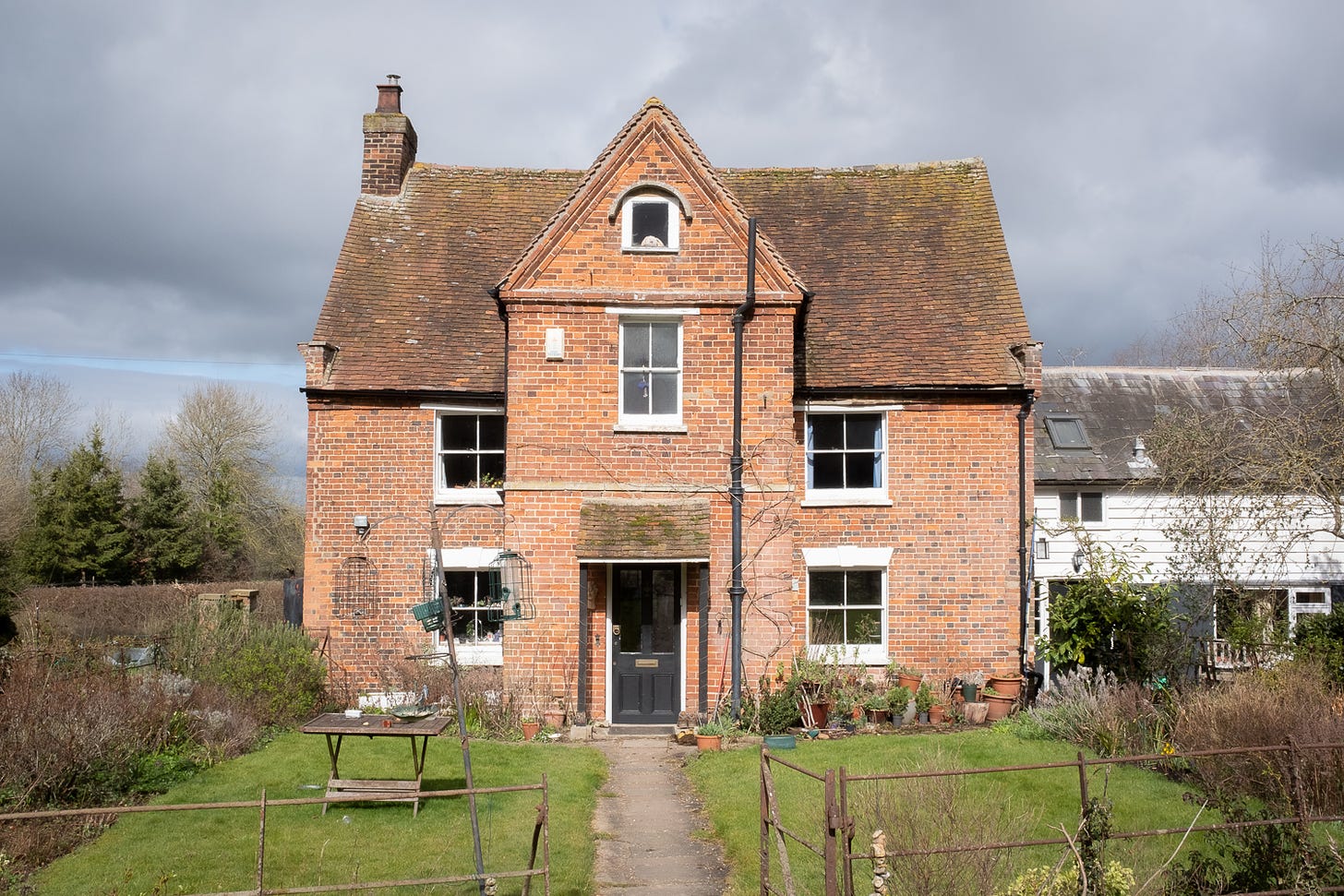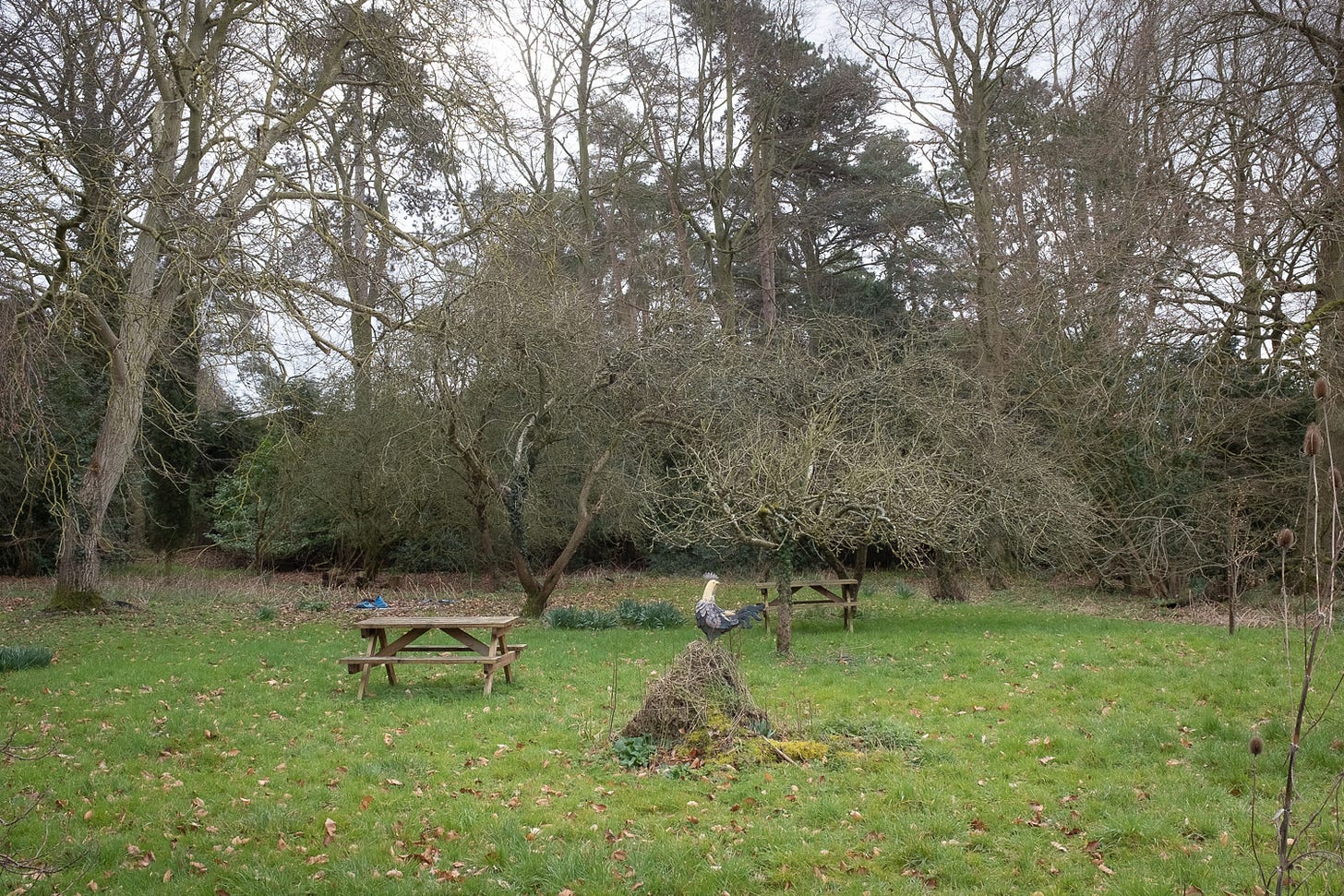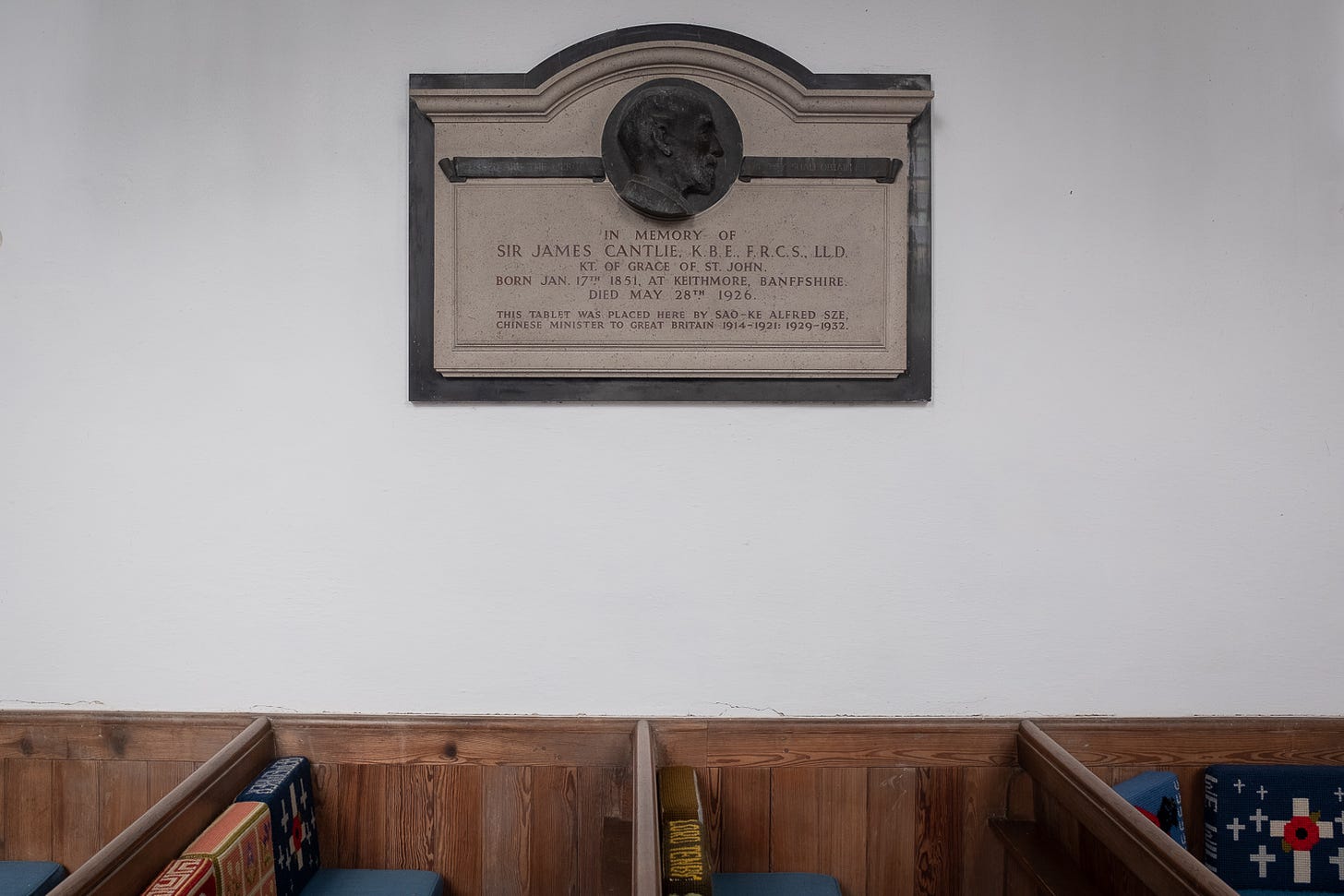Jan had beautiful skin, wrinkled like an old basketball. Johnny Flynn played on the stereo and there was a bunch of flowers on the backseat for mother’s day. She dropped me by the green and the shouts of Sunday League leapt across the park. The boys in blue were losing.
I was in Cottered, a village with deep puddles and thatched houses set back from the road. At the edge, there was a blue plaque on a cottage. “Sun Yat Sen,” it said in bold, “孫中山”. Below in smaller font, “The father of modern China.”
There was an old boy in overalls treading a fork in the garden. I walked up the drive with a smile but he said he lived next door - he didn’t know much about Sun Yat Sen. I should try knocking, he told me, the owner had done lots of research. He knew all about it. I did, blinking in the bright sun as it burst through the clouds.
Eventually, a lady came downstairs dressed in a pink dressing gown. She was red-nosed and sniffling, laid up with a cold she apologised. I apologised back, feeling guilty for disturbing. She told me she’d fetch her husband, he was the one to ask about Sun Yat Sen.
In 1895 Sun Yat Sen escaped China dressed as a woman, Chris told me at the door, handing me a blurb on a sheet of A4. In 1911 there was a revolution and he became China’s first president.
Wow, I thought, with a growing queue of questions.
“What’s the connection to here?”
“It was through a man called James Cantlie, Sir James Cantlie, I should say,” Chris continued, “They were friends from Hong Kong and during Sun’s exile Cantlie would invite him to stay here in Cottered. I’m not sure which room he used to stay in but it would have been one of them.”
“How did they know each other?” I continued, glad Chris was happy to stay and chat.
“Cantlie himself was quite a person himself,” Chris explained, “He founded the Hong Kong Medical College - which went on to become Hong Kong university - and he basically invented first aid. Things like that. He was an amazing man. We hear a lot about the bad people of the British Empire, and God knows there was a lot of bad, but Cantlie… He really meant well. He wanted to do good.” Chris contemplated for a moment.
Sun Yat Sen was one of the college's first students. Even by then, Sun had had an unusual life. He was born to poor parents in a village far from anywhere. Then they moved to Hawaii. In those days it was still an independent kingdom and his family came to own thousands of acres. Sun was bright and received a prize from the last king of Hawaii. He also became a Christian.
Back in China, he studied medicine. The Qing regime began to make him angry and steadily he got caught up in the swelling talk of revolution. China had to be modernised, they said, to compete with the West. Like most revolutions, there were several attempts, several exiles too, before the tinder caught. Their first - the Canton uprising - failed in 1895 and he was forced to flee into exile, dressed as a woman.
It was amazing hearing such a story on the steps of a cottage. A cottage which had, in some small way, played a part in it all. Chris beckoned me into the hallway where there was an old photograph, grey in the dark, of Cantlie, his wife and four children. He pointed them out, naming them. “They all went on to do amazing things themselves. One became an admiral I think. That’s Kenneth there,” he held his pinky to the boy in shorts, “My mother bought the house from him in 1957.”
Chris hatched out a small book. Kidnapped in London. “When Sun Yat Sen was exiled in London, the Chinese authorities kidnapped him. They held him hostage in the Chinese Legation and, of course they told everyone that Sun was there of his own accord etc etc. which he wasn’t. He was locked in a small room where no one could get at him. They wanted to slip him out of Britain and have him executed. The Chinese government just wanted to get rid of him you see. When Cantlie found out about all this, he managed to create a media storm and whip up public support which eventually forced the Chinese to release him. Cantlie saved his life.
“Anyway, this is the book he wrote about the whole thing.” Chris handed me the copy, turning to the right page, “The foreword’s written by Kenneth Cantlie…And here… It talks about one of his early memories of Sun.”
“It was sunset on a summer’s evening,” the passage read, "and Dr Sun was walking up and down in the orchard. He was wearing a grey frock coat and his homburg hat was tilted forward to keep the level sun out of his eyes. He had his hands behind his back and he was pondering deeply. I was about to rush up to him in my usual impetuous way when I stopped. ‘He is probably thinking great thoughts’ I said to myself and I went quietly away. I was not in the least afraid of Dr Sun who was kindness itself, but my parents and my nurse may have put the idea into my head that here was a great man who must not be interrupted when he was thinking.”
We left the hallway and stepped back into the sun. Chris led the way up the path, past an old barn and into the orchard behind. There were a few low apple trees underneath the ash tree, its bare fingers dangling towards the ground. “Just there. That’s where he would have been thinking his great thoughts,” Chris said with an air of wonder and reflection. We stood silently for a moment, imagining the figure pacing in his hat and frock coat, a revolutionary poised on the edge of seismic, earth-changing events. The ash tree would remember him. Like the young Kenneth Cantlie, I wondered what he was thinking.
Chris had known the orchard his whole life and had lived in the cottage since childhood. He was a writer with several crime novels and books on psychology, history and business to his name. His first book had been a travelogue of China. No doubt it was inspired by the enduring connection to Sun Yat Sen.
We left the orchard and went inside for a cup of tea. There were books and newspapers piled up, and the kitchen with its low beams and open brick looked as it might in the Cantlies’ day. We sat at a wooden table by a window full of flowers. The silver light slipped in like foil.
Chris was interested in my hitchhiking journey. He asked searching questions about the temperature of the country, worried the media too often missed the mark. I in turn sought advice on writing. “The great advantage writers have over journalists,” Chris said, “is that they can observe without judgement.”
We talked about Britain and how the country is in need of a new story about itself. The portrayals of old seem inadequate today; some say that’s really what Brexit was about. Nations after all are built on stories. Sun Yat Sen knew that all too well.
We returned to the great man. “You see, he’s very unusual in that everybody from all political backgrounds likes him. The democrats like him, the Maoists, the CCP now, they all revere him. Normally in history, particularly in communist countries, these figures end up getting chucked out at some point.”
“Like Trotsky,” I noted sipping my tea.
“Yes indeed. But really Sun wasn’t much of a leader. He wasn’t cut out for politics. To govern a country as big as China, what was it then, 400 million people? You have to be tough, you’ve got to be cutthroat. I think he was just too nice. Really you have to be a bit of a bastard to govern China!”
There’s a letter from Sun to Dr Cantlie that illustrates the point: “It will be your pleasure to hear from me that I have assumed the presidency of the Provisional Republican Government in China,” Sun says in clipped English, “which I accepted with disinterested fervour in order to render myself an instrumentality to rescue China with its four hundred million population from environment of impending peril and dishonour.”
The letter gives a brief insight into the mountainous challenge facing Sun. He goes on more tenderly, “It makes me feel more grateful to you. From the present position, I look back on my past hardships and strenuous toil, and think of your kindness shown me all the while that I can never, nor will, forget.”
Sun’s presidency was short-lived. It was only one year. He dodged assassination attempts and survived more exiles, but he returned with an army and made himself generalissimo in 1923. That was short-lived too. He died of cancer in 1925.
Chris had been to his mausoleum. It was impressive, he said, an enormous gleaming building right up on a hill, with vast blue steps leading up. There aren’t many people in the world with a mausoleum like that.
Time was getting on. I apologised to Chris for taking up his Sunday morning and thanked him for bringing Sun Yat Sen back to life for a while.
I stepped outside and followed Chris’ advice to see Cantlie’s rather more humble memorial in the village church. There was a gap in the hedge to a path that led right there. The orchard was quiet as I went, just the slip of the breeze. Once again I paused and saw the pacing figure, deep in thought, thinking great thoughts.







What a fascinating story!
One of my favourites so far. Great stuff.